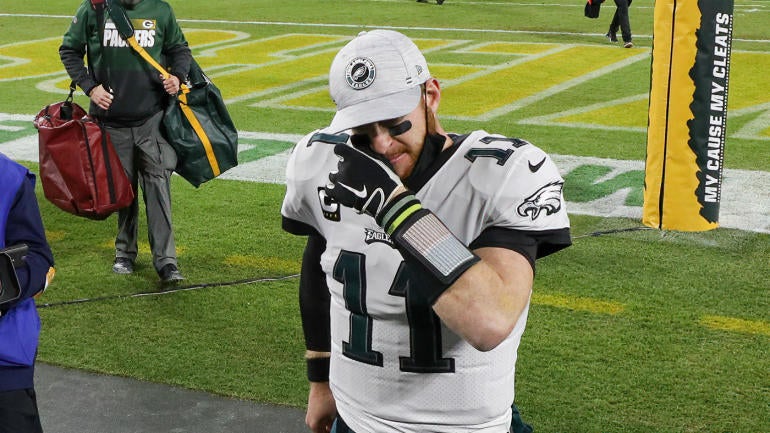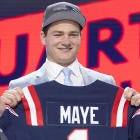
The Eagles thought quarterback was one position that didn't need to be worried about for many years to come when 2016 second overall pick Carson Wentz emerged as a leading candidate for NFL MVP in 2017 before tearing multiple ligaments in his left knee near the end of the season. Those days seem like ages ago now.
Wentz was generally regarded as an above-average quarterback who was capable of carrying the Eagles for stretches prior to a stunning regression this season. An ineffective Wentz was replaced by 2020 second-round pick Jalen Hurts midway during the third quarter of Sunday's game against the Packers. Eagles head coach Doug Pederson is benching Wentz. Hurts will be Philadelphia's starting quarterback on Sunday versus the Saints. The Eagles, who were expected to contend for a playoff berth, go into the Saints game with a 3-8-1 record.
Wentz's demotion raises questions about his future in Philadelphia. His contract probably holds the answers to those questions.
Wentz's Contract (and Eagles' 2021 cap situation)
The Eagles adhered to their longstanding practice of signing key young players to contract extensions well before they could hit the open market with Wentz. When Wentz had two years remaining on his rookie contract, he signed a four-year, $128 million extension in June 2019 containing a then NFL record $107,870,683 of guarantees. $66 million was fully guaranteed at signing. The deal is worth up to $144 million through salary escalators.
The guarantees included a $16,367,683 signing bonus and a $30 million option bonus. The signing bonus is prorated on Philadelphia's salary cap from 2019 through 2023. There's $3,273,536 of proration for 2019 through 2022 and $3,273,539 in 2023. The option bonus counts on the cap at $6 million annually from 2020 through 2024.
Wentz's cap number jumps from $18,663,586 this year to $34,673,536 next year. His 2022 through 2024 cap numbers are $31,274,536, $34,273,539 and $32 million respectively.
The NFL and NFLPA have set a $175 million salary cap floor for next year with league revenues declining due to the coronavirus pandemic. According to Pro Football Talk's Mike Florio, the salary cap might only drop from its current $198.2 million level to the $195 million neighborhood next year.
Either way, the Eagles have one of the NFL's worst salary cap situations for 2021. Under offseason accounting rules, only the top 51 salaries (i.e.; cap numbers) matter. Philadelphia has just under $263.94 million in 2021 cap commitments with 46 players under contract according to NFLPA data. There is $23.417 million of existing cap space that can be carried over to 2021.
2021 Release ($24,547,075 cap increase)
Cutting Wentz's conventionally next year is impossible. The Eagles would have $59,220,611 in dead money, a cap charge for a player no longer on the roster, by releasing Wentz before $15 million of his injury guaranteed $22 million 2022 base salary becomes fully guaranteed on the third day of the 2021 league year (March 19).
The dead money would consist of Wentz's fully guaranteed $15 million 2021 base salary, $10 million third day of the league year roster bonus that's also fully guaranteed, $9,820,611 of signing bonus proration relating to Wentz's 2021 through 2023 contract years and $24 million of option bonus proration for his 2021 through 2024 contract years.
Wentz would be off Philadelphia's salary cap after 2021 by releasing him in this manner. The guarantees have offsets so Philadelphia would get 2021 cap relief for the contract Wentz signed with another team for next season. The dead money would increase to $74,220,611 by releasing Wentz after March 19 because the fully guaranteed $15 million from 2022 would accelerate onto Philadelphia's 2021 salary cap.
2021 Post-June 1 Release Designation
(Same 2021 cap charge)
Releasing Wentz with a Post-June 1 designation before March 19 or the third day of the league year wouldn't be near as cap prohibitive for Philadelphia. Wentz would essentially be $29.6 million better off from the extension than playing out his rookie contract since he wouldn't have played any of the new contract years, which run from 2021 through 2024.
A team can release two players each league year before June 2 using a Post-June 1 designation that will be treated under the cap as if released after June 1. With a Post-June 1 designation, a team is required to carry the player's full cap number until June 2 even though he is no longer a part of the roster. The player's salary comes off the books at that time unless it is guaranteed. Since Wentz's $25.4 million salary for 2021 is fully guaranteed, it would remain a Philadelphia cap charge.
Only the current year's bonus proration counts toward the cap with players released using a Post-June 1 designation. The acceleration of the bonus proration in future contract years is delayed until the following league year, which typically begins in early to mid-March. Philadelphia's 2021 cap charge or dead money for Wentz would equal his $34,673,536 cap number.
$34,673,536 would be an unheard of amount of dead money. The largest amount of dead money related to an individual player for one league year in NFL history is Brandin Cooks' $21.8 million for the Rams this year in connection with his April trade to the Texans. The 2021 dead money would get reduced by Wentz's next contract because of the offset.
The Eagles would have a $24,547,075 cap charge in 2022 relating to the bonus proration in Wentz's 2022 through 2024 contract years. Wentz would be off Philadelphia's books beginning in 2023.
2021 Trade ($852,925 2021 cap savings)
A Wentz trade would provide the Eagles minimal cap relief because Wentz would need to be dealt before his $10 million roster bonus is due next March 19. After this date, the $10 million would be a Philadelphia financial expenditure and cap charge with a trade. Philadelphia's cap charge or dead money would consist of the $33,820,611 of bonus proration left in Wentz's contract.
There probably wouldn't be many suitors because of Wentz's regression and the acquiring team would need $25.4 million of cap room to absorb his 2021 salary, which would no longer be a Philadelphia obligation. If next year's salary cap is at or near the $175 million floor, only a limited number of teams will have the necessary cap space anyway.
In some instances, a team will convert a portion of a player's salary into a signing bonus right before a trade to make dealing him easier because the acquiring team's cap hit for the player in the current league year is reduced. Eating salary in this manner really isn't feasible for Philadelphia because the cap savings with a Wentz trade are already negligible.
The most logical destination is the Colts. Familiarity can bring comfort in the NFL. Colts head coach Frank Reich was Wentz's offensive coordinator for Wentz's first two years in the NFL, 2016 and 2017. Colts starting quarterback Philip Rivers, who just turned 39, is on a fully guaranteed one-year deal for $25 million. He is taking his career one year at a time. Rivers is playing through a toe injury that will likely require surgery after the season. Bringing Rivers back for his 18th NFL season will probably require a similar financial commitment as this year. The Colts are projected to have approximately $57.5 million of 2021 cap space with the top 51 players assuming the salary cap is set at the $175 million floor.
An acquiring team would have Wentz under contract for $98.4 million over four years averaging $24.6 million per year. That would be pretty cost effective provided Wentz could resurrect his career. It would really only be a two-year commitment for $47.4 million because of the guarantees. After 2022, the acquiring team could exit the deal without any dead money or residual cap charges.
Theoretically, the Eagles could wait until after training camps opened and trade Wentz if a team lost its starting quarterback to a season-ending injury, like when Sam Bradford was dealt to the Vikings late in the 2016 preseason after Teddy Bridgewater's career-threatening knee injury. Although Philadelphia would be eating the $10 million roster bonus under this scenario, $15.4 million of 2021 cap room would be gained leaving $19,273,536 of dead money. That's because the acceleration of the bonus proration in future contract years would be delayed until the 2022 league year since that trade would be happening after June 1.
Just like with the use of the Post-June 1 designation, the Eagles would have a $24,547,075 cap charge in 2022 relating to the bonus proration in Wentz's 2022 through 2024 contract years and nothing afterward.
2022 Release ($8,272,539 2022 cap increase)
Keeping Wentz in 2021 could mean committing to Wentz in 2022 because $15 million of his $22 million salary would already be fully guaranteed. The remaining $7 million becomes fully guaranteed on the third day of the 2022 league year. Getting rid of Wentz in a conventional manner before this happens wouldn't be too appealing for the Eagles from a salary cap standpoint. There would $39,547,075 of dead money composed of the $15 million salary guarantee and the remaining $24,547,075 of bonus proration left in the deal.
2022 Post-June 1 release ($7 million 2022 cap savings)
Using a post-June 1 designation before the third day of the 2022 league year seems to be the only way Philadelphia would release Wentz in 2022. His $31,274,536 cap number would remain on Philadelphia's books until June 2. The unsecured $7 million of base salary would be wiped out leaving the Eagles with $24,273,536 of dead money for 2022. There would be a $15,273,539 cap charge in 2023 because of the bonus proration in Wentz's 2023 and 2024 contract years. The Eagles would no longer have cap obligations for Wentz starting in 2024.
2022 Trade ($6,727,461 2022 cap savings)
There wouldn't be the same time pressure for a trade as in 2021 because Wentz doesn't have a lucrative March roster bonus. The optimal time to trade Wentz would be before the 2022 NFL Draft. Dealing Wentz would mean he didn't have a bounce-back season in 2021 or couldn't regain his starting job. Either would likely curb interest in acquiring him. If Wentz bounced back, the Eagles might be inclined to keep him.
An acquiring team would need $22 million of cap space to take on Wentz's 2022 salary. Philadelphia's cap charge or dead money would be $24,547,075 of bonus proration left in Wentz's contract. Wentz would be off Philadelphia's books after the 2022 season. Eating a portion of Wentz's salary if necessary to facilitate a trade would be a more viable concept because the Eagles could still pick up some cap room by doing so.
Final Thoughts
The Eagles are more likely to continue on their downward trajectory this season than rebound to make a push over the final four games to win the NFC East, which may only require six victories for the division title. That would probably cost Pederson his job. A new offensive-minded head coach might think Wentz could be a worthy reclamation project although the Eagles would have a high pick in a quarterback-heavy 2021 draft.
Wentz's contract and Philadelphia's cap issues suggest that he will get another opportunity in 2021 to demonstrate he can be their starting quarterback. Unless Wentz is a leading candidate for NFL Comeback Player of the Year next season, it's hard to imagine he will still be in Philadelphia for the 2022 season.





















